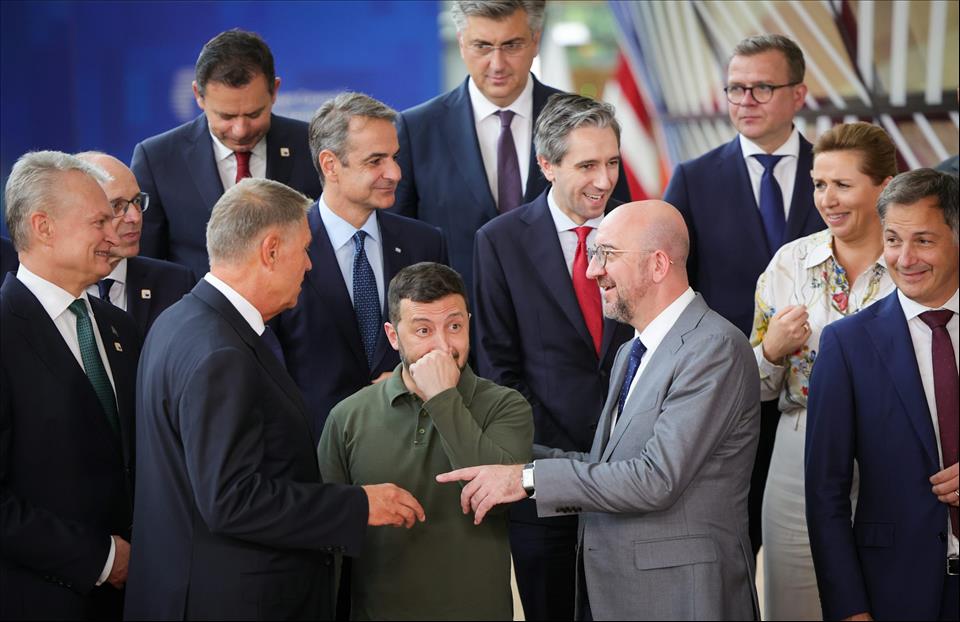
Ukraine War: Kyiv Rejects Orbán Ceasefire Plan But Global Security Deals Offer Hope
Yermak's comments came a day after Viktor Orbán, the Hungarian prime minister suggested that Kyiv should agree a ceasefire with Moscow. Orbán, who is known to be close to Vladimir Putin and who has just taken over the rotating presidency of the European Council, raised the idea during his first wartime visit to Kyiv on July 2.
Orbán has been the most sceptical of the EU leaders when it comes to European financial and military support for Ukraine. He was instrumental in delaying the agreement of a €50 billion (£42 billion) aid package for several months earlier this year.
But, despite Orbán's reticence, the EU recently agreed a bilaterial security pact with Zelensky while he visited Brussels on June 27. Under the terms of the deal ,“the European Union and its Member States will contribute, for the long term and together with partners, to security commitments to Ukraine, which will help Ukraine to defend itself, resist destabilisation efforts and deter acts of aggression in the future”.
The EU deal is the latest of 20 such bilateral agreements, including with the US and major European powers. But while they represent a show of support for Ukraine, they fall short of providing actual security guarantees. None of Kyiv's partners are willing to deploy troops for the country's defence, primarily because this is seen as a pathway to escalation into a full-scale confrontation between Russia and Nato.
So none of these security agreements are therefore likely to deter Putin in his war of aggression. But they are far from ineffective or useless. They provide ten-year commitments to train and equip Ukraine's armed forces, to strengthen the country's defence industrial base and to contribute to its economic recovery.
At the same time, they reiterate the need for Russian leaders to be held accountable and for sanctions against Moscow to be maintained, and if necessary extended. All of this sends a clear signal that Ukraine's western partners are serious about their support.
Beyond the symbolism of the sheer number of agreements, they have also had positive practical consequences for Ukraine. Kyiv's ground offensive last year may have failed to liberate much territory, but Ukraine's forces have decimated the Russian Black Sea fleet. It has had to relocate from its traditional base in Sevastopol to sites on the Russian mainland.
This has decreased the risk of any seaborne landing by Russian forces on Ukraine's Black Sea coast and has allowed Kyiv to establish a secure maritime trade corridor in the western Black Sea to enable its agricultural exports.
Similarly, Ukrainian drones have been able to reach deeper and deeper into Russian territory and attack military bases, supply routes and energy infrastructure there.
Together with fewer restrictions on the use of advanced military systems against Russian territory, Ukraine has gradually improved its position on the ground.
The town of Chasiv Yar, about 10kms south of Bakhmut, is the most hotly contested sector of the frontlines. Institute for the Study of War
This can, and should, not detract from the fact that Russia has made gains in the land war and continues to do so while also targeting Ukraine's critical national infrastructure. But it does indicate that for as long as western support is forthcoming, it is unlikely that Putin's aggression will succeed.
All eyes on WashingtonBut, for all its heroism in the field, Ukraine is very far from establishing a clear pathway to victory. Russias' economy remains resilient, Moscow continues to mobilise more troops than Kyiv, and its alliances with Iran, North Korea, and China are giving it valuable economic, military and diplomatic cover.
It is not clear how long Russia can maintain this position of at least relative strength. But neither is it clear that Ukraine's situation will continue to improve.
A return of Donald Trump to the White House after the US presidential elections in November 2024 – at present looking increasingly likely – would bring with it a resurgence of Trump's so-called “America-first” foreign policy . The US would then probably try to force Ukraine – and its other western partners – to accept Russian terms in a negotiated settlement.
Uncertainty: a possible second Trump administration is likely to change US policy towards Ukraine. EPA-EFE/Anatoly Maltsev
Without any real, hard security guarantees for Ukraine in such a settlement, Kyiv would find itself back where it was a decade ago. Faced with Russian occupation of Crimea and large chunks of eastern Ukraine – and with lukewarm support from the west – it had to rely on a worthless“agreement” with Russia and no assurances against further Russian aggression.
But this isn't a foregone conclusion, whatever the outcomes of November's presidential election. On the contrary, the multiple security agreements that Ukraine has signed over the past few months also make an alternative future conceivable.
It's a future in which, with western help , Kyiv can demonstrate the futility of Russian aggression by regaining more territory and provide more effective air defences for its population and infrastructure. Western military aid, and the permission to strike at Russian military bases will help disrupt the supply lines that have enabled Russia's battlefield victories.
In this case, Putin is unlikely to look like the kind of winner that Trump likes to back. This calculation creates a window of opportunity for Ukraine's western partners over the next six or so months to double down on, and accelerate, their support for Kyiv and future-proof what ultimately might turn out a winning strategy in a war of attrition after all.

Legal Disclaimer:
MENAFN provides the
information “as is” without warranty of any kind. We do not accept
any responsibility or liability for the accuracy, content, images,
videos, licenses, completeness, legality, or reliability of the information
contained in this article. If you have any complaints or copyright
issues related to this article, kindly contact the provider above.


















Comments
No comment